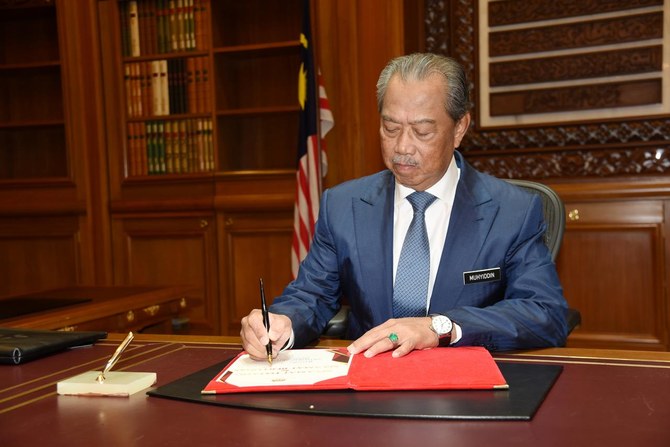KUALA LUMPUR: Malaysia’s new prime minister, Muhyiddin Yassin, unveiled his ministerial team on Monday. His aim was to deliver a “functional cabinet that delivers,” he said.
“I will create a Cabinet that focuses on delivering a more focused and effective service, is efficient, caring for people, transparent and integrated, with a more robust structure,” he added.
Muhyiddin took office a week ago, following the abrupt resignation of his predecessor Mahathir Mohamad, which sparked the collapse of the former ruling coalition. His Cabinet includes 31 ministers and 38 deputy ministers. The appointees, who include politicians and technocrats, will be sworn in on Tuesday in the presence of of Malaysia’s ruler, Sultan Abdullah Ri'ayatuddin Al-Mustafa Billah Shah.
“The government needs to demonstrate that the ministries are led by experienced hands,” said Adip Zalkapli, director of consulting firm BowerGroupAsia. “The inclusion of technocrats will very likely reduce infighting and internal political competition.”
In a surprising move, Muhyiddin scrapped the position of deputy prime minister and instead appointed four senior ministers to make key decisions in his absence: Azmin Ali, who will oversee international trade and industry; Defense Minister Ismail Sabri Yaakob; Fadillah Yusof, who is in charge of works and infrastructure development; and Education Minister Radzi Jidin.
The prime minister also introduced a number of new posts, including a minister of national unity. Muhyiddin said that “unity between the various races is a determinant of the survival….of our country.”
He also created a ministry that will be responsible for the states of Sabah and Sarawak, which are dominated by indigenous, non-Malay minority ethnic groups.
The move was interpreted by analysts as an attempt to shore up support for the new pro-Malay government, which might face challenges in protecting the interests of indigenous groups, given that MPs representing ethnic minorities are mostly in opposition.
The new lineup marks the return to the Cabinet of a number of United Malays National Organization leaders who were ministers before the party was ousted in the polls two years ago.
“The thing that stands out is that many of them served in the last UMNO government before it fell in 2018,” said Prof. James Chin, director of the Asia Institute at Tasmania University. The Cabinet “will please the Malay ground” but not the market, he added.

























